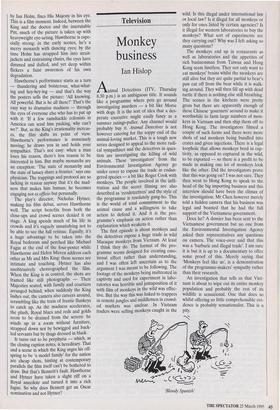Television
Monkey business
Ian Hislop Afimal Detectives (ITV, Thursday 8.30 p.m.) is an ambiguous title. It sounds like a programme where pets go around investigating murders — a bit like Morse with dogs. It is the sort of idea that a des- perate executive might easily fancy as a summer ratings-puller. Any channel would probably buy it. Animal Detectives is not however catering for the soppy end of the animal-loving market. This is a tough new series designed to appeal to the more radi- cal sympathiser and the detectives in ques- tion are investigating the killing of wild animals. These 'investigators' from the Environmental Investigation Agency go under cover to expose the trade in endan- gered species — a bit like Roger Cook with monkeys. The people involved in the infil- tration and the secret filming are also described as `ecodetectives' and the style of the programme is resolutely gung-ho. This is the world of total commitment to the animal cause and a willingness to take action to defend it. And it is the pro- gramme's emphasis on action rather than explanation which weakens it. The first episode is about monkeys and the detectives expose a huge trade in wild Macaque monkeys from Vietnam. At least I think they do. The format of the pro- gramme seems designed for creating emo- tional effect rather than understanding, and I was often left uncertain as to the argument I was meant to be following. The footage of the monkeys being maltreated in captivity and used for experiment in labo- ratories was horrible and juxtaposition of it with film of monkeys in the wild was effec- tive. But the way this was linked to trappers in remote jungles and middlemen in crowd- ed markets was unclear. In Vietnam traders were selling monkeys caught in the wild. Is this illegal under international law or local law? Is it illegal for all monkeys or only for ones listed by certain agencies? Is it illegal for western laboratories to buy the monkeys? What sort of experiments are they carrying out? Why was I left asking so many questions?
The monkeys end up in restaurants as well as laboratories and the appetites of rich businessman from Taiwan and Hong Kong seem limitless. They not only want to eat monkeys' brains whilst the monkeys are still alive but they are quite partial to bear's paw cut off from the bear while it is walk- ing around. They will then fill up with dead turtle if there is nothing else still breathing. The scenes in the kitchens were pretty gross but there are apparently enough of these Chinese 'gourmets' around to make it worthwhile to farm large numbers of mon- keys in Vietnam and then ship them off to Hong Kong. The investigators filmed a couple of such farms and there were more shots of sad monkeys being bundled into crates and given injections. There is a legal loophole that allows monkeys bred in cap- tivity, as opposed to captured in the wild, to be exported — so there is a profit to be made in making one lot of monkeys look like the other. Did the investigators prove that this was going on? I was not sure. They then went to Hong Kong to speak to the head of the big importing business and this interview should have been the climax of the investigation. Mr Chen however merely told a hidden camera that his business was legal and boasted that he had the full support of the Vietnamese government.
Does he? A dossier has been sent to the Vietnamese government but no one from the Environmental Investigation Agency asked their representatives any questions on camera. The voice-over said that this was a 'barbaric and illegal trade'. I am sure it is but it is up to a documentary to offer some proof of this. Merely saying that `Monkeys feel like us', is a demonstration of the programme-makers' sympathy rather than their research.
An investigation that tells us that Viet- nam is about to wipe out its entire monkey population and probably the rest of its wildlife is sensational. One that does so whilst offering so little comprehensible evi- dence is probably sensationalist. This is a pity.
Bloody Spanish'


























































 Previous page
Previous page